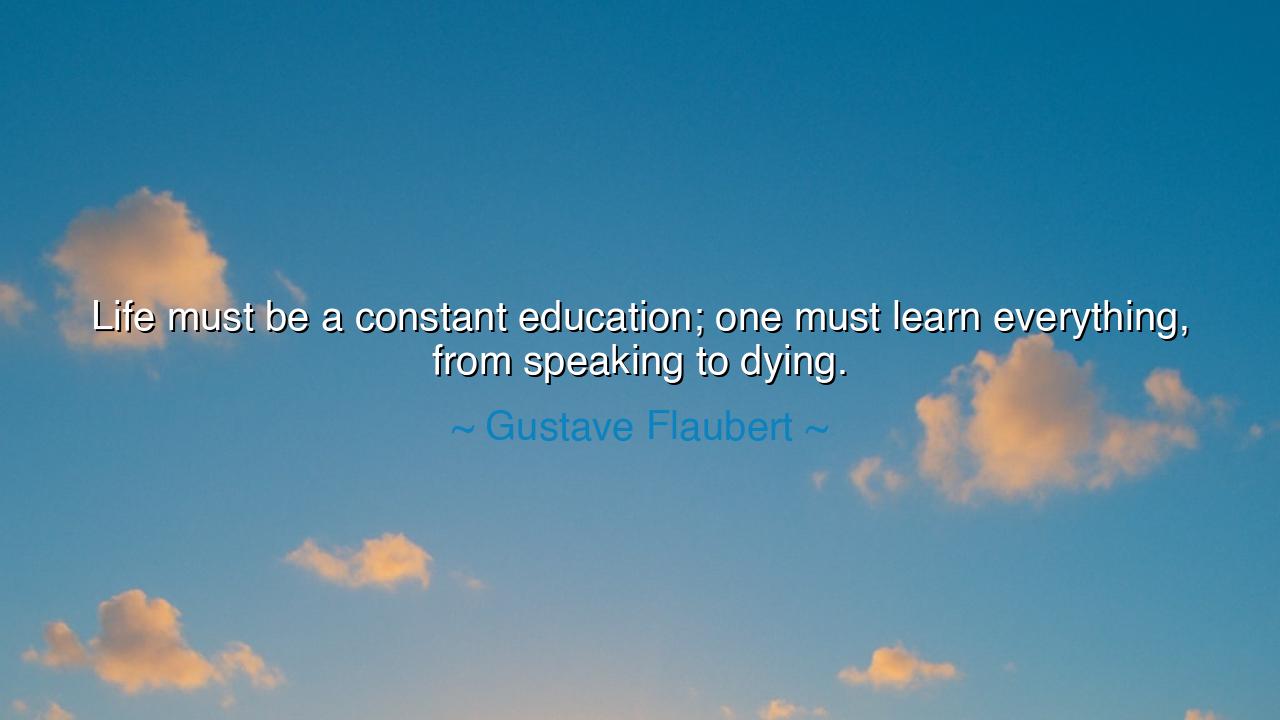
Life must be a constant education; one must learn everything






When Gustave Flaubert, the great French novelist, wrote, “Life must be a constant education; one must learn everything, from speaking to dying,” he was not merely reflecting on the mind’s thirst for knowledge — he was proclaiming a philosophy of existence. His words remind us that the act of living is itself a form of study, and that every moment — from the cry of birth to the silence of death — is a lesson in the mystery of being. In Flaubert’s view, the wise man is not the one who has finished learning, but the one who understands that he never will. Life is the great teacher, and every experience, whether joyful or sorrowful, is part of its curriculum.
The origin of these words lies in the heart of a man who was both an artist and a philosopher. Flaubert lived in the nineteenth century — an age of discovery, revolution, and disillusionment. He was a perfectionist in language, a craftsman who believed that art, like life, demanded discipline, observation, and constant growth. He knew that learning does not end with school or youth; it unfolds through every trial and triumph. By saying “one must learn everything, from speaking to dying,” Flaubert meant that the lessons of life are not confined to knowledge of the mind, but extend to the education of the soul — learning how to love, how to forgive, how to endure, and finally, how to let go.
To Flaubert, education is not a mere accumulation of facts, but a sacred transformation. We are born ignorant not only of the world but of ourselves. Every encounter, every sorrow, every joy teaches us who we are meant to become. The child learns to speak so that he may express his inner being; the adult learns silence, so that he may listen; and the wise learn acceptance, so that they may face death with grace. Thus, to “learn everything” is to embrace every stage of existence as a teacher — to see in pain a lesson in strength, in failure a lesson in humility, and in death a lesson in peace.
History gives us countless examples of those who lived this truth. Leonardo da Vinci, whose mind bridged art and science, saw no boundary between the disciplines. To him, the study of a bird’s wing was as sacred as the study of the human heart. He learned constantly — not only how to create, but how to observe, how to imagine, and how to wonder. Even in his final days, Leonardo lamented that he had learned too little, whispering, “I have offended God and mankind because my work did not reach the quality it should have.” In that humility lies the essence of Flaubert’s wisdom: that the more one learns, the more one realizes how much remains to be learned.
Flaubert’s words also carry a profound emotional power when we consider their final phrase — “from speaking to dying.” For to die well, one must have lived well, and to live well, one must have learned deeply. Death, to Flaubert, is not the end of education, but its final examination. It asks whether we have learned to value life, to love others, to forgive, and to leave the world with serenity. Those who have spent their lives learning fear death less, for they have understood its role in the cycle of existence. As Socrates once said, “To practice philosophy is to learn how to die.” Both men speak of the same truth — that wisdom is not complete until it embraces mortality.
In the modern age, Flaubert’s wisdom calls out more urgently than ever. Surrounded by distraction and noise, we often mistake information for knowledge and activity for growth. Yet true learning demands reflection — the quiet courage to question, to listen, to fail, and to rise again. Life will teach us whether we wish it or not; the wise, however, seek to learn deliberately, turning every hardship into understanding. In this way, education becomes not a burden, but a form of freedom — the liberation of the mind and the illumination of the soul.
The lesson of Flaubert’s words is both gentle and profound: never cease to learn. Let curiosity be your companion and humility your guide. Learn not only from books, but from people; not only from success, but from pain. Learn how to speak with kindness, how to act with purpose, how to forgive yourself, and how to face the unknown with peace. Make every day a classroom and every encounter a lesson. For in the end, when your final breath approaches, may you say not that you have mastered life, but that you have learned it — deeply, humbly, and fully.
And so, let Flaubert’s wisdom echo through time: that to live is to study, and to study is to grow into the fullness of one’s humanity. Life is a constant education, and each of us its eternal pupil. May we learn not only how to live, but how to live wisely — and in that wisdom, find the courage to die without regret.






AAdministratorAdministrator
Welcome, honored guests. Please leave a comment, we will respond soon